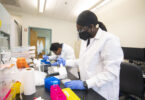Athens, Ga. – More than a dozen of the world’s leading experts in low vision treatment and research will travel to the University of Georgia to speak at the inaugural Aniridia and Low Vision Research Symposium July 15-17 at the Georgia Center for Continuing Education and Conference Center.
The Research Symposium will be held in concert with the Aniridia Foundation International 2011″Make a Miracle” Medical Conference, which takes place July 13-17 at the Georgia Center. Now in its sixth year, the AFI Medical Conference focuses on educating patients and their families on the medical and genetic aspects of aniridia.
Together, the two events will be the largest international gathering focused on treating aniridia and the broad range of developmental and ocular disorders associated with the disease. The joint meetings will provide an opportunity for scientists, doctors and medical professionals to meet and network with aniridia patients, their families and other aniridia advocates.
Aniridia is a rare, congenital eye disorder characterized by a complete or partial absence of the iris, or colored part of the eye. Most often caused by a defect in PAX6, a gene important in eye development, aniridia can lead to a reduction in the sharpness of vision and increased sensitivity to light. People with aniridia typically develop other eye problems that contribute to progressive vision loss over the course of their lives. These disorders can include increased pressure in the eye (glaucoma), clouding of the lens of the eye (cataracts), involuntary eye movements (nystagmus), macular degeneration and underdevelopment of optic nerve (optic nerve hypoplasia).
“The purpose of the medical conference is to provide access for aniridia patients and their families to people who understand the disease at the professional level,” said James Lauderdale, UGA associate professor of cellular biology and research symposium organizer. “And there aren’t that many of us, maybe 20 to 30 individuals, who work on this disease.”
Organized for the first time this year, the concurrent research symposium also will provide a formal opportunity for participating physicians and scientists to come together and formally exchange research ideas and discoveries regarding aniridia, explained Lauderdale. The event will address current and emerging strategies for the treatment of these low vision disorders, including aniridia, with research sessions focused on disorders of the anterior and the posterior eye, eye development and the genetics of aniridia.
New directions in aniridia research will be explored as well. “What we are now beginning to realize is that the PAX6 gene plays a role in some of the non-visual aspects of aniridia. These can include an inability to smell, problems with hearing, significant obesity, and a propensity for diabetes,” he said.
The research meeting also will include clinical sessions appropriate for practicing physicians, health care providers and medical professionals in training. These sessions will cover such topics as ocular surface reconstruction, iris prostheses, and the diagnosis and treatment of retinal detachment, and pediatric glaucoma. There also will be a panel discussion with the physicians addressing the unique challenges in treating the problems associated with genetic eye disorders, such as aniridia.
The keynote addresses at the research symposium will be given by Dr. Peter Netland, professor and chairman of the department of ophthalmology at the University of Virginia Health System, and Robert Grainger, W.L. Lyons Brown Professor of Biology in the department of biology at the University of Virginia.
Netland is an internationally recognized glaucoma clinician and aniridia specialist. In addition to his position at UVA, Netland also serves on the Aniridia Foundation International’s board of directors and medical advisory board. He has given numerous international, national and regional presentations, published five textbooks and written more than 300 original, peer-reviewed scientific articles, reviews, and published abstracts. Netland has received both the Achievement Award and the Senior Achievement Award from the American Academy of Ophthalmology and serves as Special Associate Examiner for the American Board of Ophthalmology.
Grainger has spent the last 20 years studying Xenopus, a genus of aquatic frogs from Sub-Saharan Africa, in order to better understand eye development. The frog is especially important as a model for basic and translational research because of its ability to regenerate some of its tissues and organs, including the lens of its eye. As the leading expert on Xenopus, Grainger also holds the position of executive director of the National Xenopus Resource facility, part of the Marine Biological Laboratory in Woods Hole, Mass.
The dinner and keynote address on Friday, as well as vendor exhibits and poster sessions, are open to participants of both conferences. The Saturday morning clinical sessions are open only to medical professionals, researchers and research personnel.
The research symposium deadline for registration, as well as abstract submissions, is June 30. For more information, see http://www.aniridia.uga.edu/.
For information about the AFI Medical Conference, see http://www.aniridia.net/.







